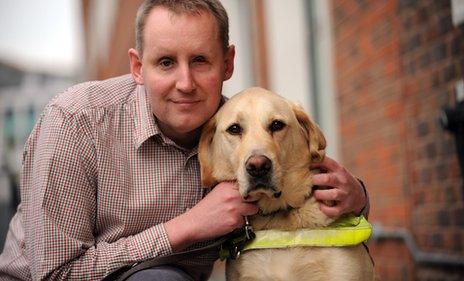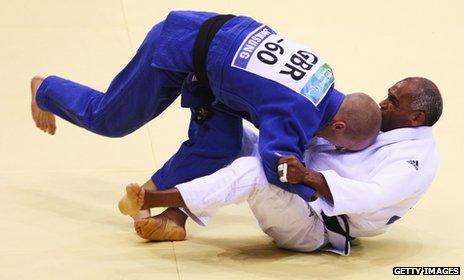How can blind people stay safe?
- Published
Umit Turkusev shows Damon Rose some of the 1Touch defence techniques
A lot of people worry when they are walking alone on a quiet urban street, but imagine how much greater the fear would be if you were blind. A growing number are turning to self-defence to help boost their confidence.
Many blind and visually impaired people rely on their dogs to get around, but what happens if the assistance animal is attacked? Only last week, a charity warned that attacks on guide dogs by other dogs had reached a new high.
But with or without a dog, a blind person is more vulnerable to attack. Sighted people can look out for cues - which are often non-verbal - to assess whether a situation may turn nasty. How many people have crossed the road, or moved seats on a bus or train because of an instinctive feeling that all is not right?
But for many blind or partially sighted people, taking such evasive action is all the harder as they miss these cues.
Tim Stirling, who was attacked on a train by two men a few months ago, says anxiety can be heightened if you are unable to judge what's happening around you.
Stirling, who has serious sight loss, explains that a lot of non-verbal communication can be missed.
The 28-year-old was attacked after he asked them to be more careful after one of the men stood on his guide dog's tail.
One of them struck out at Stirling, who was travelling with a totally blind friend.
"He was intoxicated and abusive. He said I was too young to have a guide dog and that one of his relatives needed it more than me.
"Then he hit me. A shove in my upper arm and my back. It was almost like he was goading me to respond, and I had no intention of doing that.
"After a delay, the second attack was harder than the first. I think he wanted to justify what he was doing by getting me to react.
"I could only really go on words. When I thought he was going to lay into me, I grabbed my friend and ran off the train quickly.
Stirling didn't sustain serious physical damage, but was severely shaken up.
He says initially the attack left him worried about taking the train, but he tried to rationalise it by telling himself that this was the first time he had been attacked and that it might not happen again.
Michael Wilson, regional campaigns manager for the Royal National Institute of Blind People, says "hate crime" is on the rise and, though they don't hear of many attacks on people with sight loss, personal safety is a major concern.
A growing number of blind and partially sighted people are turning to self-defence techniques to help keep them safe and boost their confidence.
One way is via martial arts techniques.
Judo, for example, is the only martial art in the 2012 London Paralympics that is exclusively reserved for athletes who are blind. Being a close contact sport makes it accessible.
Prof Stephen Nicholls has taken elements from martial arts to develop a programme for blind or visually impaired people. His method, 1Touch, he says, has been devised to work in a real-life confrontational situation.
It was designed after years of "forensically" studying what blind people perceive of the world and also themselves.
"The minute somebody puts their hand upon you, they are disabled, on the floor, and in a compromised position," Nicholls says.
When an attacker lays his or her hand on someone, the blind person is taught to put their hand on top of theirs - "touch them back".

Damon Rose with his guide dog Beckett
The idea is that the blind person then knows where the thumb is and, with that knowledge, will know how the attacker is positioned and can employ joint-attacking moves.
If they let go of the attacker, they are once again "invisible".
"You don't want to do sport, you want to do something which has an edge of reality to it," says Nicholls.
Nicholls, who has studied the anatomy of attacks on blind people, says aggressors cannot physically square up to someone who can't see because there is no eye contact and the body language is all wrong.
Body language is learned, but blind people cannot see it in others. When they walk down the street, they don't hold themselves in the same way, which means they look more vulnerable.
As a consequence, blind people aren't considered threatening and so attacks are usually close up. Nicholls says that 90% of his course is about self perception and creating confidence.
Stirling, like many disabled people, says he didn't think of himself as particularly vulnerable before his attack.
"The thing with being partially sighted is you don't feel like you're blind. It's only when this happened. I had a sense of how much I couldn't see, really. Not being able to successfully relate to the person in a visual sense, not knowing where others were and not knowing what stop I was at."
Perhaps further underlining the unique challenges blind people encounter, Nicholls says that the techniques involved in teaching his programme are very different to teaching sighted people.
"I've taught in front of 400 people before but when I have a class of blind people it's maybe 10 to 12. The instruction has to be disseminated in a different fashion. Physical contact, verbal description, one-on-one tuition, explanation, sensation - that's very, very different to a standard martial arts school."
Nicholls hopes the programme will be learnt by blind people and transmitted through the community by blind instructors.

Paralympic champion Ben Quilter (left), competes in the 2008 Beijing Games
Andrew Jones from London is in his early 40s and was initially sceptical about the idea of a self-defence programme. Now he's a convert and says it helps him to lead the kind of life he wants to lead.
"It gives you a sense of awareness, confidence, awareness of the space around you. If someone approaches you in a threatening way, you don't have to just lie on the floor and roll over, you can stand up for yourself.
"The fact you walk tall and confident makes you less of a target to start with."